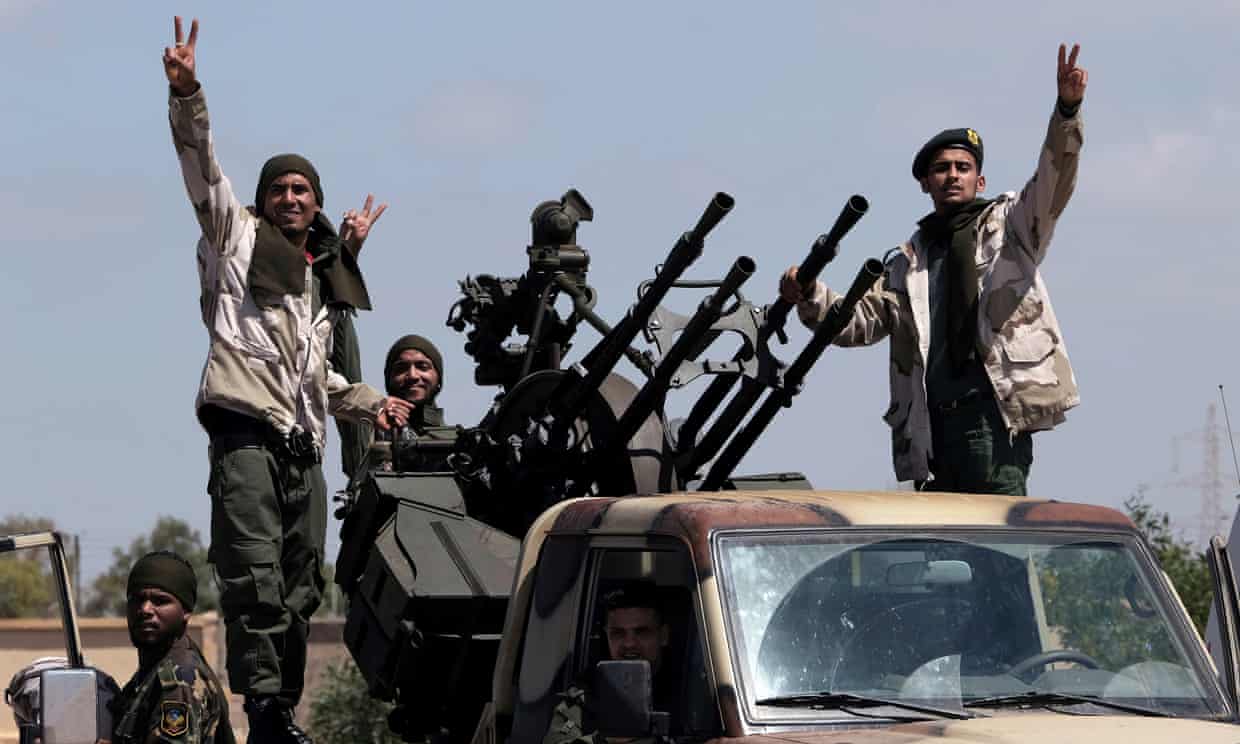
Libya arms embargo being systematically violated by UN states
by Patrick WintourJordan, Turkey and UAE singled out for ‘routinely and blatantly’ supplying weapons
UN member states have systematically violated a Libyan arms embargo, according to a long-awaited UN report due to be published on Monday that will identify Jordan, Turkey and the United Arab Emirates as the main culprits.
The report is expected to say these three countries “routinely and sometimes blatantly supplied weapons with little effort to disguise the source”. It is also likely to link the UAE to a bombing of a detention centre that has been described as a war crime.
With the UN already accused of overseeing a new age of impunity, the report’s findings are a further test of the organisation’s ability to enforce its own resolutions.
Ghassan Salame, the UN special envoy for Libya, said at the weekend that interference by foreign powers in Libya – diplomatically and militarily – was now the biggest obstacle to peace in the country, and divisions in the UN security council meant the UN had been unable even to call for a ceasefire, despite Libya being discussed there 15 times. He said the arms embargo had been violated at least 45 times since 4 April.
The report, prepared by a UN panel of experts, will not identify the country responsible for a particularly egregious air assault on the Tajoura refugee detention centre on 2 July that led to 54 deaths, but it will make it clear the attack used weapons available only to a foreign power.
The UAE, along with Jordan, and Egypt has been arming troops deployed by Gen Khalifa Haftar, the eastern Libyan military leader, who started an offensive on Tripoli on 4 April, days before the UN launched a carefully constructed peace conference. Turkey has been supplying weapons to Libya’s UN-recognised government of national accord.
Salame said Haftar had sanctioned 800 drone strikes since 4 April, and the Tripoli-based government more than 270.
The scale of the breaches, and the clear evidence, will pose a dilemma for the UN since the report may simply reveal that UN states can ignore UN resolutions with impunity. Some UN security council members hope the damaging publicity will force the states to desist.
Salame said at the weekend that he hoped on Wednesday to address the issue of external intervention by convening a final round of pre-meetings that would lead to a Libyan peace conference in Berlin in the new year, attended by the security council members plus Turkey, Italy, the UAE, Egypt and others.
Two of the aims will be to extract a commitment from all the external actors not to interfere further and to set up a permanent international body to monitor and enforce the agreements reached in Berlin, including an arms embargo.
The UN weapons experts’ report is produced annually and is subject to delays as member states wrangle about the contents.
The war had been stuck in a stalemate in southern Tripoli suburbs, but Salame said the recent intervention of hundreds of Russian mercenaries had tipped the balance heavily towards Haftar. Salame said his fear was that the Russian intervention meant the war would spread to the centre of Tripoli, leading to a bloodbath.
The Libyan foreign minister, Mohamed Taher Syala, agreed there was a real risk that Tripoli would fall to the Russian-led forces, adding: “The problem is Russia declares one thing and then on the field does something else. Certainly for Russia, Libya has strategic importance and seeks to have a foothold in the country.”
The UN experts’ report was completed before the Russian intervention but does highlight the role of mercenaries from Sudan and elsewhere.
Salame said: “Instead of tens of thousands on each side, this is a war with very few warriors,” and this left a place for well-armed mercenaries to have a disproportionate influence.
He said the Russians would not disclose their strategy, but added: “If the fighting comes closer to urban areas, the death toll will spiral to a completely different level.”
Salame said the Berlin process had six goals: a ceasefire mechanism, a means to enforce the arms embargo, a return to the political process, a package of financial and economic reforms, new security arrangements for Tripoli, and respect for international humanitarian law.
He said: “If we do not implement the agreement, I fear a bloodbath in Libya, a great migratory movement of people, instability across north Africa taking in the Sahel, and we add to the controversial list of things on which great powers already cannot reach agreement.”